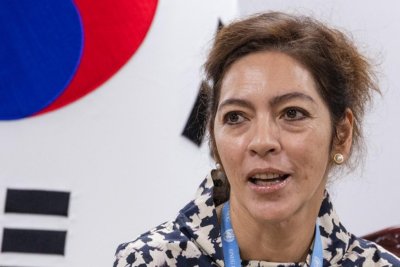UN envoy meets vice ministers in Lee administration during Korea visit

Elizabeth Salmon, the United Nations (UN) special rapporteur on the human rights situation in North Korea, speaks during her meeting with Unification Minister Kim Yung-ho (not pictured) during their meeting at the government complex in Seoul, South Korea, on 11 September 2023. File. Photo by YONHAP / EPA
Feb. 2 (Asia Today) — Elizabeth Salmon, the United Nations special rapporteur on human rights in North Korea, began a five-day visit to South Korea on Monday, meeting vice minister-level officials under the Lee Jae-myung administration, a shift from ministerial-level meetings held during the previous government.
The visit, which runs from Feb. 2 to 6, marks Salmon’s third official trip to South Korea since assuming the post and her first since September 2023.
During earlier visits in 2022 and 2023, Salmon met with ministers and vice ministers from the Ministry of Foreign Affairs and the Ministry of Unification, discussing broad cooperation on improving human rights conditions in North Korea. This time, her meetings with the South Korean government are limited to vice minister-level officials, reflecting differing policy approaches between the former Yoon Suk Yeol administration and the current Lee government.
The Foreign Ministry said Salmon met Monday with Vice Foreign Minister Kim Jin-ah to discuss the current state of North Korean human rights.
Kim praised the rapporteur’s efforts to raise international awareness of human rights abuses in North Korea and expressed hope that her work would contribute to tangible improvements for North Korean citizens. She also commended Salmon for focusing her report to the 61st session of the UN Human Rights Council on the Universal Periodic Review process and urged continued engagement.
Salmon said she would explore technical assistance to help North Korea implement recommendations it accepted through the review process and support efforts to promote dialogue and engagement.
She is scheduled to meet Vice Unification Minister Kim Nam-joong on Wednesday, as well as officials from other government bodies including the Ministry of Justice, according to officials.
During her first official visit in 2022, Salmon met with then Foreign Minister Park Jin, then Vice Foreign Minister Lee Do-hoon, Ambassador for International Cooperation on North Korean Human Rights Lee Shin-hwa, and then Unification Minister Kwon Young-se. On her second visit in 2023, she also met with former peace negotiations chief Kim Gun and former Unification Minister Kim Young-ho.
During this visit, Salmon is also meeting with North Korean human rights groups and defector organizations to hear their assessments and recommendations. She plans to hold a news conference on Thursday to outline the results of her trip.
Salmon will reflect the findings from the visit in her annual reports on North Korean human rights to the UN Human Rights Council in March and the UN General Assembly in September.
— Reported by Asia Today; translated by UPI
© Asia Today. Unauthorized reproduction or redistribution prohibited.
Original Korean report: https://www.asiatoday.co.kr/kn/view.php?key=20260202010000760
